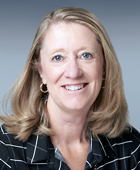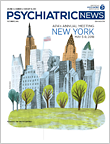The APA Annual Meeting is just a few short months away, and I’m very excited to share some of the great sessions and events that promise to make our meeting in New York City one of our very best.
The theme this year is “Building Well-Being Through Innovation.” I chose this theme because it touches on one of the core focuses of my presidential year while embracing the truth that psychiatry is a rapidly evolving field made up of physicians doing groundbreaking work. As technology advances, new opportunities and challenges in the delivery of quality care will present themselves.
This year’s meeting is designed to explore the pressing topics of physician burnout and the future of psychiatry, with a diverse array of 500 sessions, 37 courses, and eight tracks. Once again, our Scientific Program Committee, headed by Chair Linda L.M. Worley, M.D., has done a fantastic job designing an educational program for our attendees that is bold, innovative, and true to their role as medical leaders for the mind, brain, and body.
Burnout is a serious concern for physicians in all stages of their career, and while its impact on the psychiatric workforce may be hard to measure, it is pervasive among the entire medical profession. More than half of physicians in the United States report feeling at least one symptom of burnout, with emotional exhaustion topping the list. We have dedicated an entire track to
physician burnout and well-being to address this issue. Sessions will explore strategies for promoting physician wellness and interventions that can help both psychiatrists and our colleagues in other branches of medicine.
The Addiction Psychiatry track will include topical sessions running the gamut on the treatment of substance use disorders, with special attention to combating the opioid crisis. The NIMH Research track is made up of six sessions presented by some of the leading researchers in the field to bring the latest research findings to the practicing clinician (see page 10). Other tracks include Child and Adolescent Psychiatry, Forensic Psychiatry, Geriatric Psychiatry, Consultation Liaison Psychiatry, and the Residents, Fellows, and Medical Students (RFM) track.
Last year, APA’s Division of Education enjoyed great success in implementing new and engaging ways to make the Annual Meeting experience as meaningful as possible with the debut of the Mental Health Innovation Zone in San Diego. This year the Innovation Zone will be bigger and better and will help attendees adapt to and thrive in the ever-changing landscape of technology in mental health services. Don’t miss the Psychiatry Innovation Lab (a “Shark Tank”-style competition) and other curated educational activities in the Innovation Zone exploring new ideas, technology, digital medicine, entrepreneurship, and networking opportunities.
There will be plenty of lectures, workshops, courses, and sessions in other formats that will highlight and explore the intersection of psychiatry, innovation, and technology. This programming is designed to be accessible to psychiatrists at all stages of their careers. It will include an exploration of teaching with video and the use of mobile apps and telepsychiatry to help improve well-being and the treatment experience for psychiatrists and patients alike.
The interactive Learning Labs place a focus on hands-on learning, collaboration, and rich discussion around issues impacting psychiatry (see page 35). Laura W. Roberts, M.D., M.A., will lead residents, fellows, and early career psychiatrists through a two-day leadership boot camp that will discuss topics such as development of leadership and networking skills, self-advocacy, giving feedback, negotiation, work-life balance, and practical habits for success. This learning lab got very good feedback from attendees in San Diego.
Another Learning Lab session titled “Preventing a Crisis Before It Happens: Principles of Non-Violent Crisis Intervention” will give attendees the opportunity to develop crucial skills in de-escalation and nonviolent crisis interventions. Many psychiatrists in both inpatient and outpatient settings are confronted with individuals who are verbally and physically disruptive. Participants will practice verbal and nonverbal skills designed to defuse tense situations before they develop into full-blown crises. Learning how to manage these situations effectively and safely can have a tremendous positive impact on the outcomes for our patients.
During the Opening Session, retired U.S. Army Lt. Gen. Mark Hertling, former commanding general of U.S. Army Europe, will give a talk on how physicians can apply leadership principles developed by the military to medical practice. Lt. Gen Hertling joined us at the last IPS: The Mental Health Services Conference in New Orleans, and we are thrilled to
have him back.
This issue of
Psychiatric News contains the meeting’s preliminary program and information on special sessions and our host city. For the most up-to-date information, please check the
Annual Meeting site and follow
@APAPsychiatric on Twitter. I hope you will join the conversation and engage in live tweeting during the meeting using
#APAAM18. The free APA Meetings App is available now with more features than ever, so please
download it and share with your colleagues.
The APA Annual Meeting is the foremost psychiatric event in the world. It is a fantastic opportunity to get to know colleagues from all over the world and learn about the work they are doing and the scientific progress being made in our field. I look forward to seeing you in New York City for what promises to be another fantastic Annual Meeting! ■

